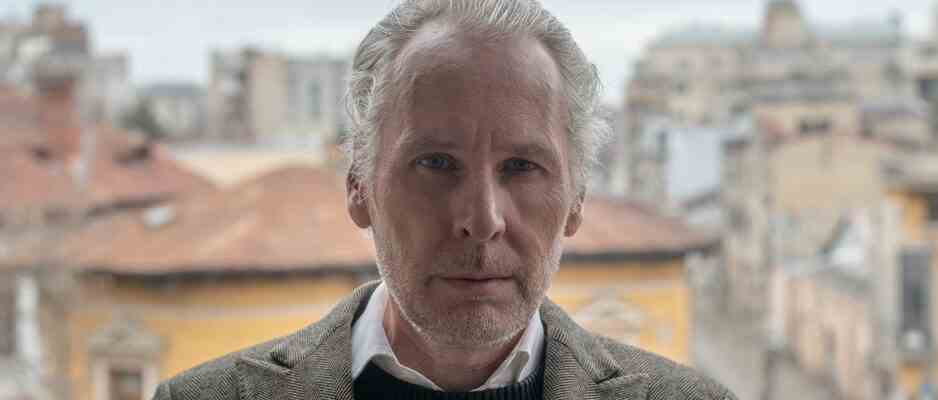Norris von Schirach found that there were already too many people with the same name in the media. So he published his first novel “Pale Heroes” 2018 under the pseudonym “Arthur Isarin”. His debut, a garish portrayal of the post-Soviet chaos years at the turn of Yeltsin and Putin, enriched with considerable insider knowledge, was received with so much friendly attention that the author no longer had to fear that he would be lost among all the other Schirachs. Which is why his second novel is now appearing under his own name.
“Beutezeit” presents itself as a kind of continuation of the first novel in terms of the main character, milieu and topic. Again, it’s about the bankruptcy after the collapse of the Soviet Union – about state failure, anarchy and corruption in a deregulated economic world and the gold-digger greed of a new oligarchy of predatory capitalists. Although Schirach shifts the time period from the 1990s to the noughties and the setting from Moscow to Almaty, from Putin’s Russia to President Nursultan Nazarbayev’s Kazakhstan, his perspective is the same in both novels. Anton, as he calls a German businessman in his prime, not unlike himself, who wants to make money from the upheaval in the post-Soviet East, where he is wildest, without giving up his ironic distance from his own cynicism and the vulgar greed of his kleptocratic environment.
The novel “Pale Heroes” tells of Anton’s ten slovenly but culturally enjoyable years in Moscow (keywords: Bolshoi Ballet, Anna Netrebko), during which he “allowed himself to drift between frivolous cultural fattening and infamous commodity deals”. In “Beutezeit” Anton now travels to Kazakhstan to set up a steel mill there on behalf of a dubious New York investment company. He has no illusions about his chances of success in this corruption-ridden Central Asian police state, but hopes for an interesting adventure in Almaty, an ethnically diverse and scenic city. He hopes it will relieve his chronic ailment: boredom.
The country’s ruling power clique needs to be lubricated efficiently at all levels
Anton’s first contacts in the city are accidental acquaintances, but prove to be extremely momentous for his company. A beautiful young Uzbek woman, the mistress of an aspiring Kazakh politician, gives him access to the country’s ruling power clique, which must be efficiently bribed at all levels, right up to the prime minister, the most shameless greedy maw of all.
She also puts him in touch with an all-round helper: Boris, a Russian who is as smart as he is unscrupulous. From then on, Boris is at his boss Anton’s side in all semi-legal to semi-criminal activities that are needed to assert oneself in this corruption swamp of barbaric raffkes.
The most unscrupulous privateer in plundering the resources of Kazakhstan is a young Chinese businesswoman who is in the vanguard of China’s Silk Road Project heard. Anton recognizes that China is using sleepy Kazakhstan as a testing ground for its global campaign of conquest, but doesn’t want to see himself as a robber among robbers: “He saw himself more as a humble ferryman navigating through streams of anonymous capital, distant and without disturbing identification with of the matter. He usually forgave himself as long as he remained aware of the ridiculousness of his strange life.”
Norris von Schirach: Booty time. Novel. Penguin, Munich 2022. 346 pages, 24 euros
(Photo: Penguin Verlag)
Anton savors the ambivalence of his dual role as a participating observer in this bizarre, morally deregulated biotope to the full. And the end turns out to be a clash with a cliché-affine Chechen killer clan – an encounter that finally suggests Anton to write off his losses and book a return flight to Europe.
Norris von Schirach makes sure that his hero doesn’t grow on you. It does illustrate Anton’s inconsistency by granting him access to a romantic alternative milieu – to the clean alternative world of mountaineers who have fled civilization, in whose base camp in the Tian Shan Mountains he can recover from the nasty demands of Almaty.
But Anton is and remains an unsympathetic snob who cultivates his occidental arrogance in the wild East by indulging in his penchant for old classics like Glenn Gould or Callas and caring for his precious ennui in order to exquisitely balance his moral indolence. He encounters the depravity of all Kazakh conditions with the disgusted nonchalance of a jaded guest parasite, not without being aware of the hedonistic emptiness of his existence.
However, his gesture of distanced cooperation is not atypical for the ambivalent behavior of Westerners outside the scope of the social ethos of their world of origin. It is above all this subtle criticism of the West that makes Norris von Schirach’s “Beutezeit” worth reading.

